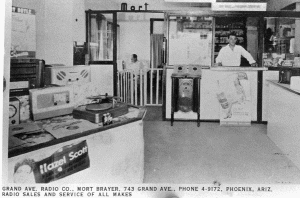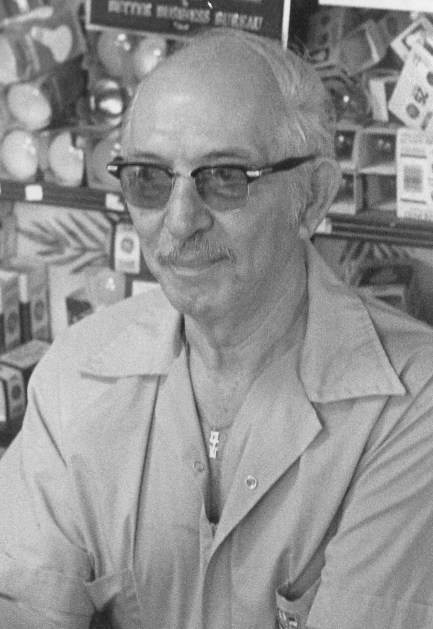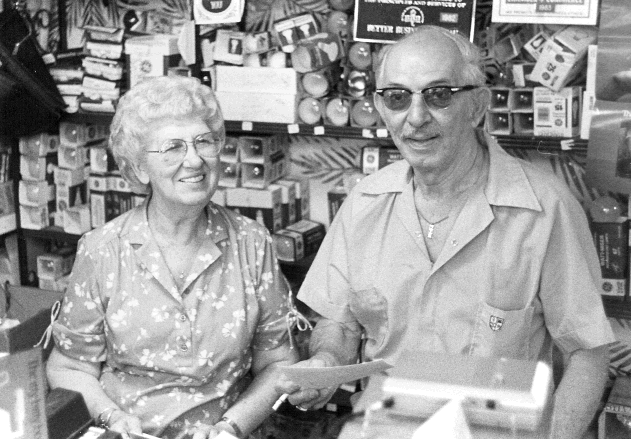|
Mort Brayer's Grand Ave. Radio Co. 1934-1965 The post card read, "GRAND AVE. RADIO co., MORT BRAYER, 743 GRAND AVE., PHONE 4-9172, PHOENIX, ARIZ. RADIO SALES AND SERVICE OF ALL MAKES. Clyde Watson had been sharing interesting bits of information and trivia from his collection with Ed and Lee Sharpe, when he spotted the post card from an early Arizona radio shop. Ed Sharpe always one to track down any interesting lead started looking for "Mort Brayer". Actually it only took two phone calls since he remembered meeting a fellow named "Whitey Brayer" who had been in the radio business. Whitey turned out to be Mort's brother. On June 22nd, Ed met with Mort Brayer at his lamp shop in Youngtown. The following is an interview on that occasion. MORT: In 1934, my brother, Whitey and went into business together as partners under the name of Radio Supply Co. Eventually he wanted to go into wholesale parts and I wanted to stay in retail. So we split and closed, the business when we both went into the service. I was in the Air Force communications. When we got back, he stayed on the east side doing business under the name of Whitey's and I stayed on the west side and was known as Mort Brayer's. We were in competition. I had about five radio stores over the years then in 1965 I had a heart attack and the doctor told me I could be a live grandfather or a dead millionaire so I retired. ED: When would you date the photo post card? MORT: That was about 1947, at 7th Avenue and Van Buren. After the War in 1946, I opened up again at the same place I'd been before. There's a big building there. I built that building. ED: What do you remember about the early days of TV?
MORT: When TV first came out the manufacturers weren't putting out too many... they couldn't keep up the supply. In I think 1948, we bought the first TV set that ever carne out of Motorola to Arizona. We installed it in the Navy Hospital. Frankly speaking we were scared to death of TV. We were told that we had to wear big rubber aprons and rubber gloves to handle the picture tube. I had put up a big antenna and we picked up Oklahoma City, Houston ... what they call ed skip. There weren't any stations here in Phoenix at all then. The people out there at ASU didn't believe that we were getting these distant TV broadcasts so we set up a meeting with the newspapers and a group of people to watch and they took pictures of US receiving these stations. Now this is even more interesting, interesting as all get out! And it can be proven! I don't remember the date but the British Broadcasting Company picked up an American TV station KLEE and I think that was either Oklahoma or Houston. Now we were picking it up skip ourselves. The BBC took pictures to document it when they picked it up in England. The strange part of it is that on the day that the BBC picked up KLEE's signal, KLEE had been off the air for three months prior. It had gone bankrupt. ED: What radio lines did you carry in your store? MORT: There were all lot of these small radio companies out of California like Packard Bell, Mission Bell, and Jackson Bell - I think those guys were all related. Then we carried Motorola, Philco and as the time went on we took on the better known lines. ED: Was Atwater Kent out of business by then? MORT: Yes, they were out of business.
ED: What other memories do you have of the radio business? MORT: There's so many interesting stories. I remember one lady I sold an Emerson 12 inch console. She came in about a year and a half later and she wanted another set, it didn't have to be bigger, but that would "catch" more stations. She didn't remember that you have to turn the tuner to get more channels! I want to tell you a funny thing about this phonograph in this picture. We had a customer down in Gila Bend who had a grocery store. Back then they couldn't get any radio stations out there. This was one of those phonographs that had a little transmitter in it and you tuned it in on your radio. I put it onto an aerial at his store and He put a microphone on it and there he had a radio station! You could pick it up five miles away and people listened while they drove around in their cars or whatever. He'd get on every morning and give a little news like, Mrs. So and So had a baby yesterday, and old Jake cut his foot but will be all right, then he'd read the store's grocery specials for the day and then play some music. He got by with that for three or four years until the FCC stopped him.As I said before, I am a veteran. I made it a policy to hire veterans when I had my business. When I closed I had thirty-three employees and all but the two girls in the office were disabled veterans. I'm past commander of the Luke-Greenway Post of the American Legion, and several other veteran organizations.
|




